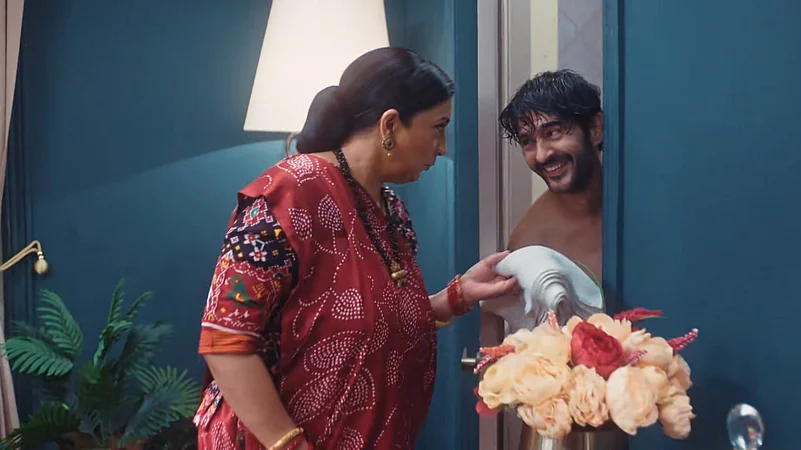
Summary of this article
This year, to celebrate Kyunki Saas Bhi Kabhi Bahu Thi’s 25th anniversary, the franchise unveiled its first glimpse of a new season on July 3.
The reboot reunites some of the original characters, led by Smriti Irani and Amar Upadhayay.
The season recycles tired tropes, leans on careless storytelling, and stubbornly refuses to evolve from the flaws it bore a quarter century ago.
“Handsome Pappa, Mummy Golgappa” might sound like a line you’d hear in a comic reel. It’s not. It is, in fact, credited to Ekta Kapoor’s brand of genius. On July 3, the first glimpse of Kyunki Saas Bhi Kabhi Bahu Thi 2 sparked interest amongst many, as Smriti Irani returned as Tulsi. With this rehash, Irani becomes the highest-paid television actor, earning 14 lakhs per episode. As she heads the Virani household again and promises to bring back “sanskaar”, one asks—what is the need and why now? Cementing its place in meme-culture, the tagline of the show: “Purani peedhi se nayi tak ka safar” is quite distant from its actual impact.
The episode begins with the famous house tour introduction song—a jingle so memorable that it was used by Anurag Kashyap in the opening scene of his epic film Gangs of Wasseypur (2012). A very metaphorical Tulsi plant guards the entrance of their home. Tulsi talking to the tulsi plant and declaring how it purifies, protects and nourishes a family is too much narcissism for the brain to handle. The entire Virani family—especially the men of this household—cannot find their towels, their breakfasts or even wake up if it isn’t Tulsi spoonfeeding them. She single-handedly takes pride in doing everything for everyone (despite having lots of househelps, drivers and staff who do most of it). Mihir (Amar Upadhyay) and Tulsi’s marriage anniversary anchors the first two episodes, echoing moments from the show’s very first episode with Sudha Shivpuri.

Between Mihir and Tulsi, the first season deals with issues like her fear of his infidelity. But this time around, the topic is Tulsi’s body. The family Tulsi sacrifices herself relentlessly for is always sure to remind her of how attractive Mihir still looks as compared to her. Confronting Tulsi’s bodily insecurities, Mihir tells her that she looks older than him, carries wrinkles, has gained weight, and that her clothes no longer fit, offering a clumsy, half-hearted attempt to state that this isn’t her fault. His vocabulary is less reassuring and more passive-aggressive—the careless writing reeking of ill-intent. The whole premise of body shaming Tulsi is justified by the reasoning that women who take care of others do not get the time to take care of themselves. There’s no intention within Mihir or the family to change that as well; it is what it is.
The Viranis employ every possible way to express their soft misogyny—both outward and internalised. Traditional gender roles, if dismantled, will crumble the facade of these sanskaars and hence, Kyunki… repackages them. But it fails to be discreet. Mihir gifts Tulsi a car for their anniversary, while her children press her to finally learn driving. He dismisses it lightly, suggesting she can always have a driver—after all, why would she drive a car he gifted her? And why would he want his gharelu wife to take the wheel or even hear her response to her children’s suggestion? For a show that wants to rebrand, its take on women belonging in the kitchen also leaves a ghastly aftertaste. Tulsi herself says, “Ghar mein maa-beti agar khana banaye aur poore ghar mein uski khusboo aaye, tabhi ghar ghar jaisa lagta hai.” Such vikaas, much wow.

Kyunki… insists upon the absolute power of upbringing, placing the full weight of responsibility squarely on parents—especially mothers—for how their children navigate the world. Tulsi is perpetually burdened by guilt: internalising every deviation of her kids as her own, whether it is Angad (Rohit Suchanti) or Pari (Shagun Sharma). In a brilliant scene where Mihir discovers his daughter Pari’s relationship, his reaction reveals the season’s very first unfiltered emotion. He lashes out, screaming at Tulsi over her perceived elusiveness regarding her daughter having an “affair”. Tulsi alone bears the weight of his fury, designed to absorb it, and he channels blame at her maternal presence, at her constant homebound vigilance, yet still failing to truly know her daughter.
Lurking from the corners, like a thief in the bushes, Gayatri (Kamalika Guha Thakurta) is the jealous one, dismissive of Tulsi’s blind fan-following within the Virani household—plotting her downfall, pressing her ear against doors, barely sleeping. The vamp versus the goddess is a tired trope—isolating women who voice dissent, branding their defiance as transgressive, while elevating the silent, enduring heroine who absorbs suffering without challenge.
From calling Baa “qabristaan ki chaukidaarni” to cooking up all sorts of antics, my favourite antagonist from the franchise remains Tripti (Suvarna Jha)—whose sharp makeup, razor wit, and unforgettable comebacks cemented her in meme culture memory. She truly represents cynics like me, perhaps. It is as comical as it is eye-opening to notice that the newer generation roots more for Tripti than they do for Baa, simply because she refuses the silence that traditional expectations demand from her and is extremely iconic while doing so. The overtly polished goodness now evokes a certain disdain in newer audiences—a reaction older viewers might never have registered.

This isn’t to say the writers of this show are blind to the meme culture currency of their material. The awareness lingers, almost anticipating that newer generations will join the discourse, if not through lived resonance, then through memes. In an earlier episode of season one, Tripti delivers the most self-aware line to Tulsi, after Smriti Irani returns to replace Juhi Thakral (Gautami Gadgil): “Yeh Tulsi phirse badal gayi? This is ridiculous. Woh toh doosri Tulsi thi na, temporary wali, usne sabko bigaad diya hai. Inn gadho ne ye bhi nahi socha ki Tulsi ka chehra badal bhi gaya ho, uska kad achanak kam kaise ho gaya? Asli Tulsi toh Qutub Minar ki tarah mere saamne khadi hai.” This tongue-in-cheek, self-deprecating humour makes clear that the writers are leaning into the absurdity, knowing their work breeds meme-worthy moments. Mihir may change faces and so does Tulsi; yet, the story continues undeterred, thriving on the very illogic that should dismantle it. The audiences have grown up but Tulsi and her family haven’t stepped out of the problems they had in the 2000s. The pretence of being progressive is worse than being bad at it. It is ironic that the show’s title itself intends to humanise “the bahu” but ends up doing the opposite.
The common notion also remains that these shows carry no critical importance of their own and are simply a medium of passing time, especially for women. However, such a perception is simplistic and out of touch with reality. Daily soaps require tuning in every day: sometimes at odd hours and sometimes after the entire family fights over the TV remote. It becomes a part of a household’s routine—actively, if you’re emotionally attached to the show; and passively, if you always have to bear with the dhum tana na melodramatic background score echoing in your home. To call daily soaps “mindless” is unfair, when a huge crew is responsible for rigorous writing, shooting, editing and distribution—all executed at speed, often with only a slim margin between production and telecast. Many iconic TV shows like Bade Achhe Lagte Hain (2011) and Pavitra Rishta (2009) have been rebooted for new seasons to revive the television audience’s interest by cashing on a franchise that’s proven to have been loved widely.

If the past grants any lessons, it is imperative and wise to never bring it back, especially if the sole motive is to replicate its success. Sometimes, what was cherished in the past may be best left as a memory—it doesn’t always need a revival. Nostalgia brings with it a certain blindness to what once was, making films, television, or any media from one’s younger years appear far more promising than they may have been. Creators of such shows recognise that those same households and audiences have evolved. With OTT platforms now in direct competition with traditional television, the demand for sharper, more layered storytelling has never been higher. Quality is no longer optional; it is the currency of engagement, and every narrative choice must resonate with viewers who are both discerning and impatient.
This season could have aimed for introspection, a corrective gesture toward past missteps—seeking to step beyond catfights or debates over the legitimacy of love marriages. This isn’t to deny that the Indian population continues to embody patriarchal ideals. It is to insist that storytelling must search for a silver lining or even diverge from it entirely in order to move towards something better. Yet, without women characters crafted with subtlety and care, television cannot claim to be progressive. Kyunki…, dipping as quickly as it re-emerged, is quite frankly reflective of what happens when one underestimates the intelligence of new-age viewers.
























